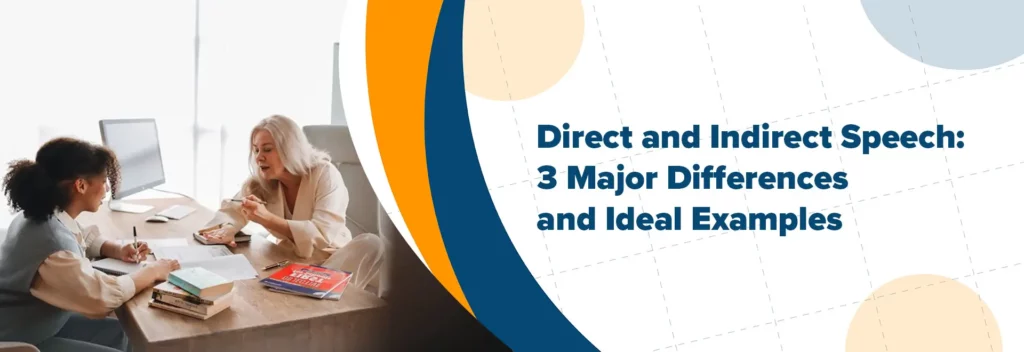
Direct and Indirect Speech: 3 Major Differences and Ideal Examples
Table of Contents
A Personal Note
A few years ago, I was new to Facebook and was fond of writing posts on my News Feed. I remember writing “I heard someone say you are not going to graduate.” This caught the attention of one of my Facebook friends which led him to write a comment and correct it.
I was embarrassed, thinking that my post was set to public and everybody could read it. His comment was “I heard someone say that I was not going to graduate.” It was thought-provoking me and made me curious. Writing it was more embarrassing than saying it. Then I learned about the nature of direct and indirect speech in the English language.
Have you had the same experience as I had? Have you ever caught yourself saying, “He was like, ‘I totally told you so!'” only to realize you’ve just stumbled into the confusing world of direct and indirect speech? Did you really realize that?
I, too, did not realize that until I studied English deeply. Both direct speech and indirect speech are confusing, but they are easy to learn when we focus on understanding them better.
You, too, can learn them easily. Bear with me as I introduce you to the messy but worthwhile learning world of direct and indirect speech. Let us study them together in this article.
What is Direct and Indirect Speech?
In grammar, direct and indirect speech are not easily noticed if they are correctly used or not especially when speaking. Sometimes, interlocutors don’t care whether they are uttering the right speech or not as long as they can communicate their ideas well with others.
However, in language learning, you must learn the meaning and usage of both speeches to communicate effectively. Direct speech is literally uttering the exact words spoken by a speaker. This means that someone who imitates speech utters the same words.
In speaking, direct speech is usually recognized through the tone and emotions conveyed by the speaker. For example, the sentence “She said, ‘Don’t go there!’” can be identified as direct speech when the way it is delivered is based on a strong impact on the listener. Sometimes, a pause is observed to clearly emphasize the exact words in the original statement.
In writing, direct speech is recognized when you see a comma and quotation marks (“…”) on the statement just like the one mentioned in the previous paragraph. The use of quotation marks is an indication that the utterance is direct speech.
Indirect speech, on the other hand, is the modified version of the original statement. This means that when you want to give specific information from an utterance or statement, there is no need to emphasize the tone or emotion in the sentence.
Look at the example sentences below.
“She said, ‘Don’t go there!’” – direct speech
She said that I shouldn’t go there. – indirect speech
By looking at the above examples, you can easily distinguish the differences between direct and indirect speech.

What are the differences between Direct and Indirect Speech?
As you already know, direct and indirect speech is not similar in all aspects except for the intended meaning that a speaker wants to convey.
- Quotation Marks and Exclamatory Points
Direct Speech: Always uses quotation marks (“…”), especially in writing, to set off the exact words spoken by the individual. It also uses exclamatory points to emphasize emotions.
Indirect speech: Do not use quotation marks, as they summarize or report the content of the speech in your own words.
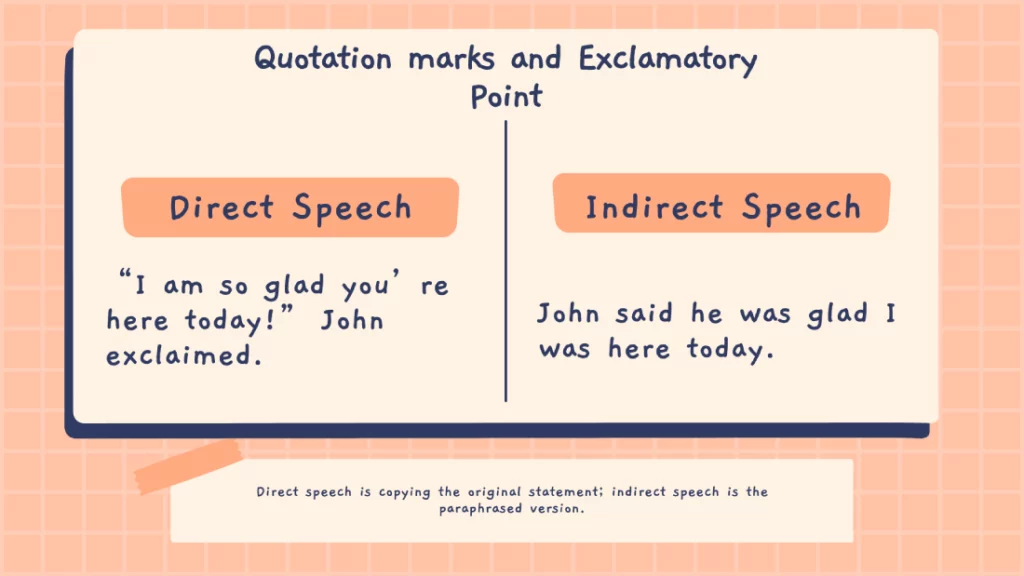
- Structure and Sentence Order
Direct speech: Always follows the original sentence structure and punctuation used by the speaker. Whatever was uttered by the speaker is just the same as in the quoted sentence.
Indirect speech: Its structure is usually modified, particularly the tenses used. The modified sentences use the past tense when reporting the original statement. Pronouns are also changed to appropriately fit the context.
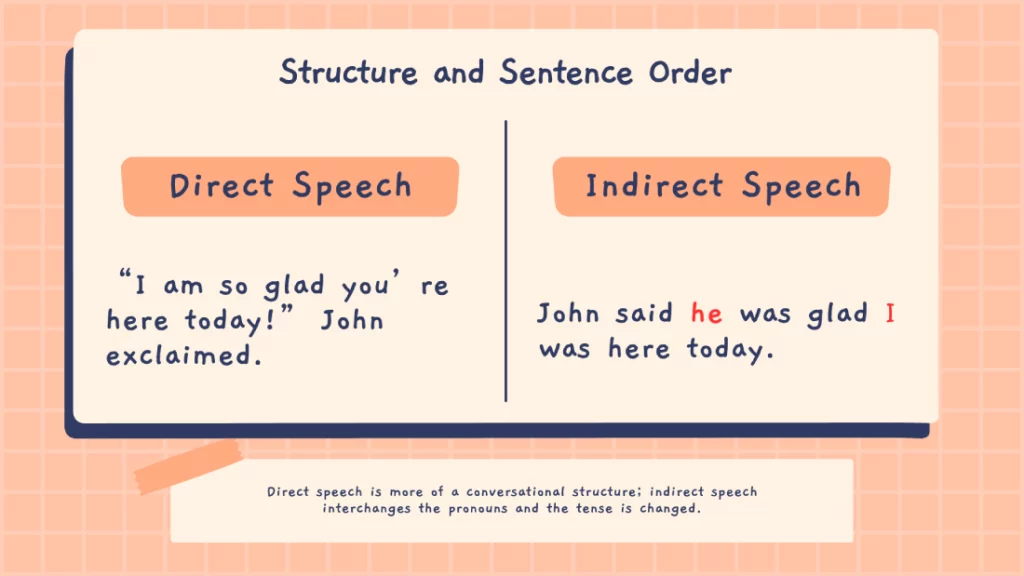
Notice that in indirect speech, the pronouns were changed and switched positions so that the meaning of the sentence is not compromised.
- Tone and Emotion
Direct speech: Imitates the speaker’s exact tone and emotions through their specific word choice and sentence structure. If reported verbally, the speaker imitates exactly the entire content of the original statement, as well as the emotions shown.
Indirect speech: It may not fully convey the speaker’s original tone or emotions, as it’s a modified version. The reporting sentence might only focus on the content of the message, not the speaker’s feelings. In short, there are no emotions in indirect speech.
Try acting out the sentences below based on direct or indirect speech.
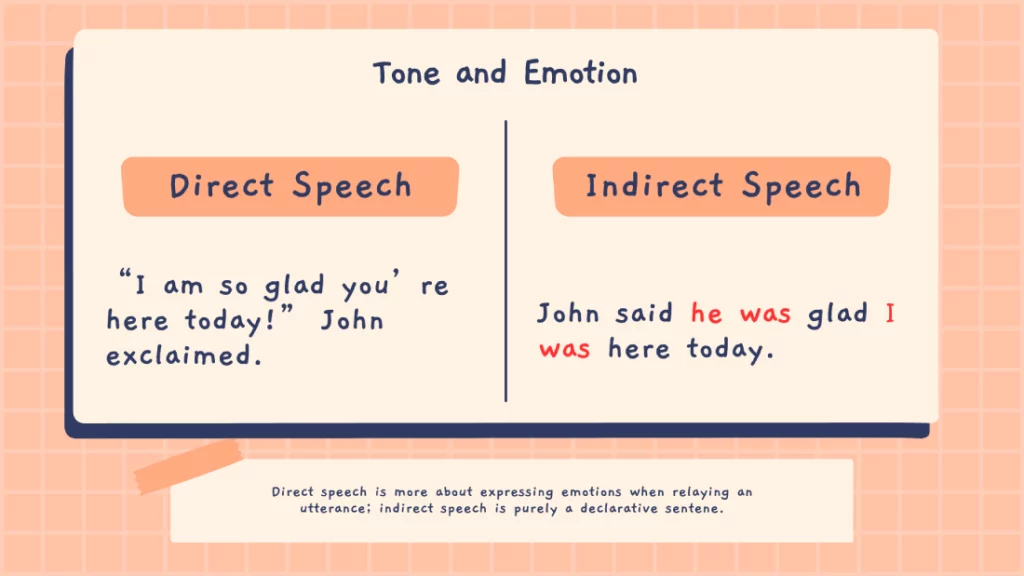
Here are some other examples of direct and indirect speech for better comprehension.
Direct Speech | Indirect Speech |
“I love ice cream,” he exclaimed with a smile. | He exclaimed with a smile that he loved ice cream. |
“I will call you later,” she promised. | She promised she would call him later. |
“See you at the conference,” Ms. Brooks said. | Ms. Brooks said she’d see me at the conference. |
My mom commented, “Steve Harvey is such a legend in hosting.” | My mom commented that Steve Harvey was such a legend in hosting. |
“Look out! There is falling debris,” shouted the man in black. | The man in black shouted to me to look out as there was falling debris. |
In summary, direct and indirect speech differ greatly in tone and emotion (verbal reporting) and sentence structure (written reporting).
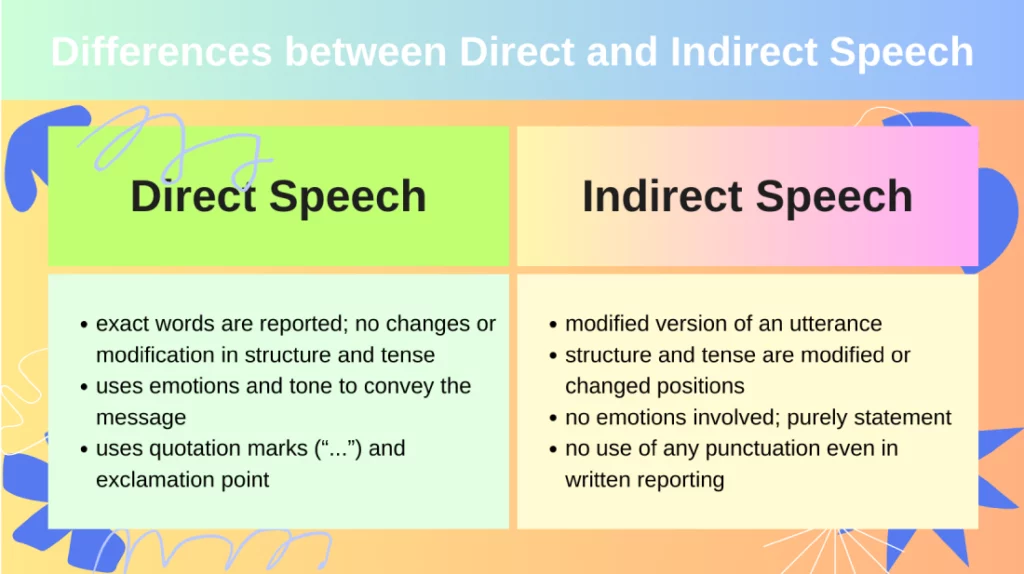
Why should we use direct and indirect speech correctly?
It’s just that simple. If you want to be more proficient in the English language, learning direct and indirect speech is important. It helps you communicate effectively whether you are writing stories, reporting news events, replying to emails or texts, telling anecdotes, or simply having free conversations with others.
Simply understanding their differences and usage in sentences can give you meaningful interactions with the people around you.
Challenge Yourself!
Let’s check your knowledge of direct and indirect speech. Complete the table below by filling in the correct sentence based on either direct or indirect speech. The answers are found here.
|
Direct Speech |
Indirect Speech |
|
“What do you need the money for?” asked my mom. |
|
|
Dad said that John was supposed to be here at this time. |
|
|
Mr. Smith announced that there would be a salary increase next month. |
|
|
My friend told me, “Hold your breath; we’re almost there.” |
|
|
My best friend said that my sister looked elegant in her wedding gown. |
|
|
Our teacher told us, “The principal will resign in December.” |
|
|
“She’s the most beautiful girl in school,” uttered my brother. |
|
|
The manager desperately exclaimed that the sales had gone down. |
|
|
The girl shouted at her mom, “Mom! Where did you put my new pair of shoes?” |
|
|
Ms. Wilson murmured that the new employee received a higher salary compared to hers. |



